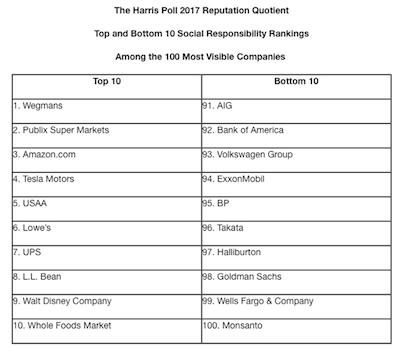Consumers are divided on whether companies that develop corporate social responsibility programs are undertaking these initiatives because they’re legitimately compelled to do what’s right, or if they’re simply offering public relations platitudes in a bid to elevate brand awareness.
 |
According to the latest annual Harris Poll Reputation Quotient study, which tracks the perception of the 100 most visible companies in the U.S. by asking consumers to rank their reputations across a half-dozen key attributes, 45 percent said they believe companies embark on CSR initiatives because they believe it’s a role they should play as leaders in their communities. Conversely, a similar amount — 40 percent — said they believe companies develop CSR initiatives only to bolster their public image and establish social value for stakeholders.
Out of the 100 companies measured by consumers for corporate reputation, only eight achieved an “excellent” CSR ratings this year, suggesting that most Americans feel the majority U.S. companies have a long way to go when it comes to excelling at corporate social responsibility initiatives. On the other hand, that paltry figure actually places more companies under the “excellent” social responsibility umbrella than any other time in the poll’s 18-year history (by comparison, only four companies received “excellent” social responsibility ratings in 2016; seven years ago, no companies earned this designation).
East Coast supermarket chain Wegmans topped the Harris Poll RQ list this year in terms of earning consumers’ highest social responsibility ranking, the second time the NY-based grocer has earned a top spot in the survey. Southeastern supermarket chain Publix Super Markets, Inc. took second place, the third consecutive year that employee-owned grocer has landed a top spot on the list. Amazon took third place, the second consecutive year the Internet’s largest retailer has landed on the list, after it achieved the highest Harris Poll rating ever last year, followed by electric car maker Tesla Motors. Fifth place went to military-oriented bank USAA. Filling out the top-ten list for top social responsibility this year were Lowe’s, UPS, L.L. Bean, Walt Disney Company and Whole Foods Market.
Harris' research found that American consumers believe respectful treatment of employees and customers, as well as a commitment to ethics, are the most important undertakings a company can make when it comes to shaping corporate reputation. Employee treatment ranked highest (39 percent), followed by ethics (38 percent) and respectful treatment of customers (35 percent). Providing affordable and accessible products and services, as well as safe working conditions, also ranked high on the list, at 29 percent and 28 percent, respectively.
By comparison, bottoming out the list was Wells Fargo, falling 19 points — the survey’s largest drop — to number-99, the result of its disastrous 2016 fraud deposit and credit card accounts scandal (Wells Fargo last year accounted for the largest reputation drop in Harris Poll history). Wells Fargo is now beat only by agricultural technology giant Monsanto — number 100 — when it comes to terrible reputation. Bank of America, Samsung, Procter & Gamble Co. and Goldman Sachs also saw their reputations plummet this year, declining -8.4, -6.8, -6.1 and -5.8 points, respectively.
Volkswagen Group, which still finds its reputation bruised from its bombshell 2015 emissions scandal, appears to be on the reputation rebound, albeit modestly, with its social responsibility score improving 7.9 points — the largest single increase of the year — to a still-comparitely-terrible standing of 93. Hobby Lobby, Capital One Financial Corporation, Burger King, Toyota Motor Corporation, 21st Century Fox and Prudential Financial also showed signs of being on the reputational upswing, posting social responsibility gains of 7.3, 7.1, 6.7, 6.2, 5.5 and 5.3.
The survey also found that Millennials are the generation significantly more likely to attempt to influence family and friends, either in person or online, regarding a company’s perceptions, with more than half — 51 percent, more that double the percent of Baby Boomers — admitting they’ve participated in conversations of this nature with others.
Baby Boomers, on the other hand, appear most concerned about the amount of personal information companies retain about their customers (82 percent, compared to only 69 percent of Millennials). On the other hand, nearly half of all Millennials polled — 46 percent — said they’ve declined doing business with a company because they were concerned about how their personal information was protected.
Harris Poll’s Reputation Quotient survey asked consumers to rate the 100 most visible companies in the U.S. on social responsibility attributes such as environmental responsibility, supporting good causes and community responsibility, and polled more than 23,000 Americans online between November and December.


 Consumers continue to place a premium on corporate responsibility, but they increasingly want to see that responsibility directed toward issues that affect the bottom line, according to a new study from Mission North
Consumers continue to place a premium on corporate responsibility, but they increasingly want to see that responsibility directed toward issues that affect the bottom line, according to a new study from Mission North Not all pressing issues require corporate voice! Brand stewards must must ask why and when their brands should engage, or if they need to engage on a particular issue at all.
Not all pressing issues require corporate voice! Brand stewards must must ask why and when their brands should engage, or if they need to engage on a particular issue at all. Dollar General investors voted in support of a shareholder resolution at its May 31 annual meeting for an independent third party audit of “worker safety and well-being.”
Dollar General investors voted in support of a shareholder resolution at its May 31 annual meeting for an independent third party audit of “worker safety and well-being.” Nonprofits and philanthropists have a unique opportunity to take ownership of conversations surrounding pressing social issues.
Nonprofits and philanthropists have a unique opportunity to take ownership of conversations surrounding pressing social issues.


 Have a comment? Send it to
Have a comment? Send it to 
No comments have been submitted for this story yet.